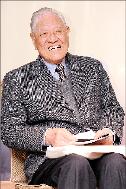Former president Lee Teng-hui (李登輝) yesterday said Taiwan should replace the Republic of China (ROC) Constitution with a new constitution that reflects modern realities.
Lee said the ROC Constitution, enacted in China in 1947, is not suitable for Taiwan and should be replaced by a Taiwan basic law and that ultimately a new constitution should be enacted.
Lee made the remarks during an event organized by Taiwan Advocates in Taipei with four academics who were representatives of a student movement in 1991 known as the Wild Lilies (野百合學運).

Photo: Chang Chia-ming, Taipei Times
Back then, Lee met the student representatives and accepted their four demands, which were that Lee dissolve the now defunct national assembly, abolish the Temporary Provisions Effective During the Period of Communist Rebellion (動員戡亂時期臨時條款), call a state affairs meeting and set a timetable for political and economic reforms.
Four of the representatives met Lee again yesterday and each asked the former president questions about constitutional reform, cross-strait relations and the intricate relationship between the Chinese Nationalist Party (KMT) and business consortiums.
On constitutional reform, Lee said the ROC Constitution was amended six times during his presidency. These amendments, collectively known as the Additional Articles (增修條文), ended the Temporary Provisions Effective During the Period of Communist Rebellion and gave “electors of the free area of the Republic of China” — consisting of Taiwan proper as well as the outlying islands of Penghu, Kinmen and Matsu — the right to vote on constitutional amendments.
“The ROC Constitution is like temporary housing where we have not much choice but to stay there because of Taiwan’s special situation,” he said.
Lee said how the ROC Constitution should be dealt with hinged on the good faith of future leaders and their belief in the country.
National identification was a key component building a -Taiwan-centered consciousness, he said.
With a Taiwan-centered orientation, many problems such as the economy, the Constitution or cross-strait relations would naturally be resolved, he said.
Thirteen years after Lee made his announcement of the “special state-to-state” theory in 1998, many things have changed, he said.
“Taiwan must be stronger and China must change,” he said. “One of the biggest differences between Taiwan and China is that Eastern and Western civilizations co-exist in Taiwan, but this is not the case in China.”
On the KMT’s much criticized close ties with big businesses, Lee said that back then the KMT was rich, with very substantial party assets.
Therefore, it was natural to play the leading role of an investor. Of course, there were advantages and disadvantages, he said.
Asked whether he would have done things different if he had a second chance, Lee said he saw things differently now.
It was true that the KMT was a profit-making business, but the private sector also benefited significantly from the booming economy, he said.

A Ministry of Foreign Affairs official yesterday said that a delegation that visited China for an APEC meeting did not receive any kind of treatment that downgraded Taiwan’s sovereignty. Department of International Organizations Director-General Jonathan Sun (孫儉元) said that he and a group of ministry officials visited Shenzhen, China, to attend the APEC Informal Senior Officials’ Meeting last month. The trip went “smoothly and safely” for all Taiwanese delegates, as the Chinese side arranged the trip in accordance with long-standing practices, Sun said at the ministry’s weekly briefing. The Taiwanese group did not encounter any political suppression, he said. Sun made the remarks when

PREPAREDNESS: Given the difficulty of importing ammunition during wartime, the Ministry of National Defense said it would prioritize ‘coproduction’ partnerships A newly formed unit of the Marine Corps tasked with land-based security operations has recently replaced its aging, domestically produced rifles with more advanced, US-made M4A1 rifles, a source said yesterday. The unnamed source familiar with the matter said the First Security Battalion of the Marine Corps’ Air Defense and Base Guard Group has replaced its older T65K2 rifles, which have been in service since the late 1980s, with the newly received M4A1s. The source did not say exactly when the upgrade took place or how many M4A1s were issued to the battalion. The confirmation came after Chinese-language media reported

The Taiwanese passport ranked 33rd in a global listing of passports by convenience this month, rising three places from last month’s ranking, but matching its position in January last year. The Henley Passport Index, an international ranking of passports by the number of designations its holder can travel to without a visa, showed that the Taiwan passport enables holders to travel to 139 countries and territories without a visa. Singapore’s passport was ranked the most powerful with visa-free access to 192 destinations out of 227, according to the index published on Tuesday by UK-based migration investment consultancy firm Henley and Partners. Japan’s and

BROAD AGREEMENT: The two are nearing a trade deal to reduce Taiwan’s tariff to 15% and a commitment for TSMC to build five more fabs, a ‘New York Times’ report said Taiwan and the US have reached a broad consensus on a trade deal, the Executive Yuan’s Office of Trade Negotiations said yesterday, after a report said that Washington is set to reduce Taiwan’s tariff rate to 15 percent. The New York Times on Monday reported that the two nations are nearing a trade deal to reduce Taiwan’s tariff rate to 15 percent and commit Taiwan Semiconductor Manufacturing Co (TSMC, 台積電) to building at least five more facilities in the US. “The agreement, which has been under negotiation for months, is being legally scrubbed and could be announced this month,” the paper said,